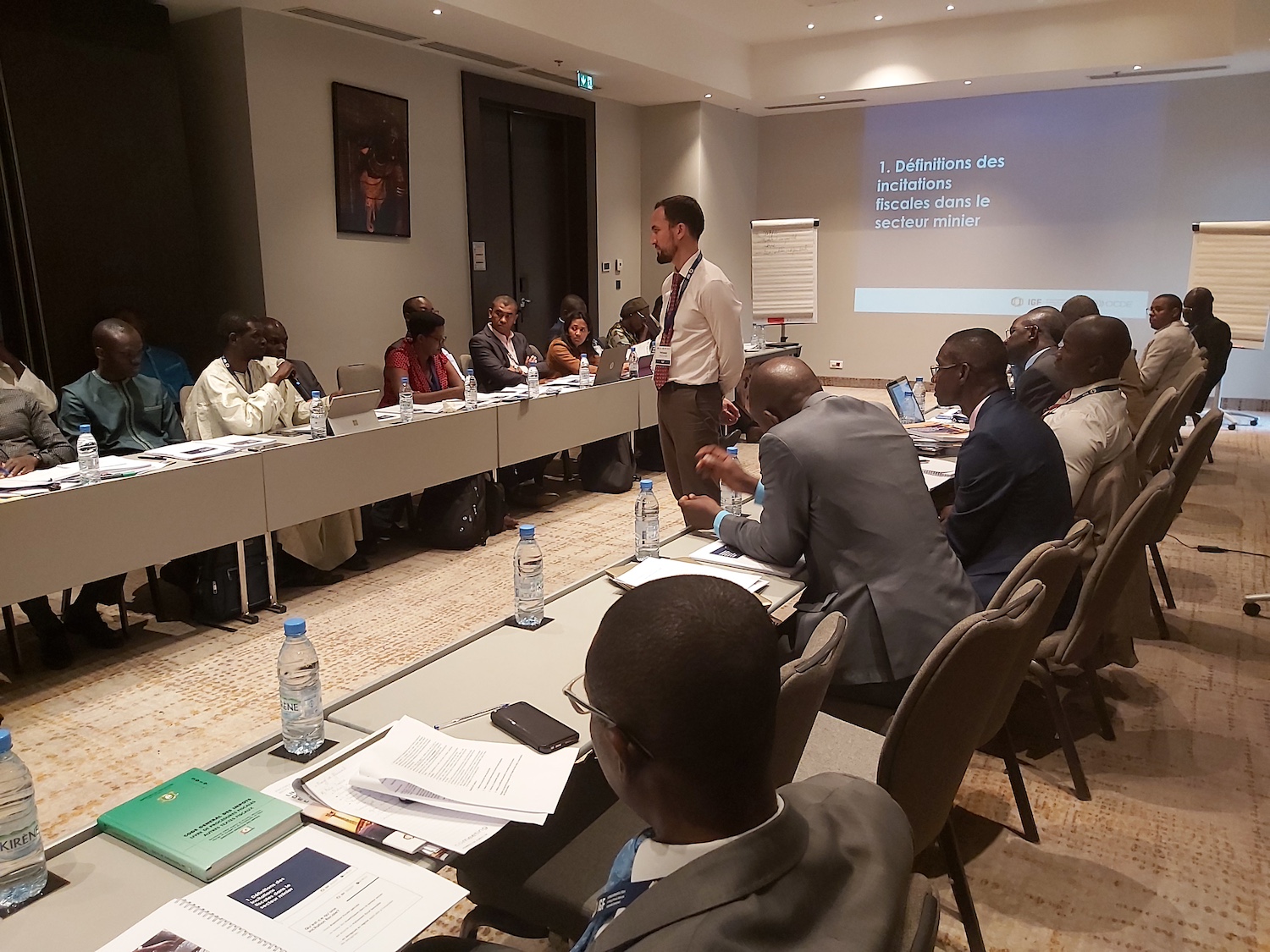
Heavy equipment at the Chuquicamata copper mine in Chile. (Image: Bruna Fiscuk/Unsplash)
In this series, we’ve explored many of the impacts of mining projects on the natural environment and nearby communities. Our focus is examining the solutions to these problems that ensure the minerals necessary to power the low-carbon energy transition can still be secured.
The subject of today’s exploration is taxes. While that might sound like an immediate snoozer, the tactics employed by mining companies to shift profits from one country to another are fascinating, to say the least. Depending on how you look at it, you might also describe those tactics as manipulative and morally suspect.
Whatever your take is, it’s hard to deny that the countries and communities relying on that tax revenue are being done some form of injustice.
“The harm in this case is indirect, but it's still serious because often the dream of having more public services and public resources can actually generate support from local communities for extractive projects,” said Tove Maria Ryding, policy and advocacy manager for tax justice at the European Network on Debt and Development. “Many mining communities do not have proper schooling or health care.”
The Organization for Economic Co-operation and Development estimates between $100 billion and $240 billion per year in tax revenue is lost globally due to corporate profit-shifting practices. Is it all legal?
“It’s a big grey area,” says Thomas Lassourd, lead on tax and extractives at the Intergovernmental Forum on Mining, Minerals, Metals and Sustainable Development (IGF). “Some of it is legal as long as local laws and regulations allow it, but some companies really stretch the interpretation of the law.”
Lassourd and IGF work with governments worldwide to uncover profit-shifting schemes and help those countries recover some of their lost tax revenues.

How multinational mining companies shift profits
“What it all boils down to is the fact that the tax system is just not very well designed to tax multinational corporations,” Ryding said. “A mining company is taxed as an independent company in every jurisdiction where it operates instead of as one global company.”
This system allows mining companies to shift profits to sister companies in low-tax countries, avoiding the higher tax rates in countries where they extract and process minerals. These tax avoidance strategies are captured under an umbrella term: base erosion and profit shifting. One of the more common methods is transfer pricing, by selling products or services to a sister company in another country at prices absurdly high or low as compared to fair market value.
“Developing countries are very tired of having a global tax system that just doesn't benefit them, doesn't work for them and doesn't give them much revenue,” Ryding said.
Work that Lassourd and IGF did in West Africa with the government of Guinea provides a real-world example. They saw some irregularities in export prices of bauxite, an ore that is the world’s main source of aluminum. While IGF doesn’t know if mining companies are engaging in aggressive transfer pricing schemes, it acknowledges the rarity of the export prices.
“I don’t have information on how these companies were structured, and we don’t know exactly if every company was using a profit shifting scheme,” Lassourd said. “What we were able to see, however, is that bauxite in Guinea was exported much lower than what market prices would have us think it was worth.”
Using transfer pricing tactics to sell products, services, or raw materials to sister companies at discounted rates reduces the profits in the country of extraction and shifts them to the low-tax country when that sister company eventually sells the minerals. The parent company earns the same profits, minus the costs associated with transportation, but pays the preferred tax rate instead.
On the recommendations of Lassourd and IGF, Guinea implemented a safe harbor regime for bauxite export prices, which is a calculated range of prices that the Guinean government deems acceptable. If mining companies export bauxite within the safe harbor, those transactions are free from being audited. If they export outside of that safe harbor, they may be subject to investigation by the government.
By keeping bauxite export prices within this safe harbor, neither the government nor the mining companies have to exhaust major resources by engaging legal teams and conducting audits.
Similarly, IGF recently helped Senegal implement a safe harbor price range for phosphate. Phosphate sales in Senegal totaled nearly $950 million in 2022, while mining companies paid just $13 million in taxes to the Senegalese government that same year.
Transfer pricing can be applied to more than just minerals. Sister companies may sell professional services, capital assets, or other company property between each other to shift profits out of high tax jurisdictions. High-interest loans are also a common profit-shifting practice, with the interest payments conveniently moving money out of high-tax jurisdictions.
Challenges closing the profit shifting loophole
With mining giants having operations in many different countries and a suite of subsidiaries with which they can exchange products and services, trying to keep track of all of their fiscal maneuvering can be quite challenging for governments with limited resources.
“One of the issues is that a lot of countries don't have up-to-date laws and regulations on base erosion and profit shifting,” Lassourd said. “Another issue is that even when countries have updated laws and regulations on transfer pricing, they might not have the capacity to enforce them very strictly.”
A further complicating factor with transition minerals like lithium and bauxite is the lack of clearly established market prices.
With gold, silver or copper, for example, market prices are well established and easily found. Transition mineral prices are not as clear, and a handful of companies may control the market for these minerals. The volatile nature of mineral markets adds complexity to determining fair market values.
Changing tax policies is also not so straightforward. Countries that do this run the risk of being sued by companies in international arbitration courts. This mechanism, called investor-state dispute settlements, provides an outlet for companies to sue governments when they change laws on things like taxes, environmental protections or human rights.
More than one-third of these cases are brought by mining companies against states that have nationalized mining projects or sought to boost taxes, according to one report. The threat of investor-state dispute settlements, which are sometimes multibillion-dollar lawsuits, can freeze a government into inaction, a phenomenon known as regulatory chill. An issue we previously covered for this series.
How organizations are closing these loopholes
Organizations like IGF, the Global Alliance for Tax Justice, the European Network on Debt and Development, and Tax Inspectors Without Borders are all working behind the scenes to ensure that multinational mining companies pay their fair share of taxes in the countries where they are due.
When IGF assisted Mongolia with its tax policies, it audited a large multinational mining company and found that an additional $228 million in taxes should be paid. The company quickly paid the bill in full.
As Argentina prepares for the transition mineral boom, it called IGF for assistance. IGF used financial models to guide the government’s tax policies on copper and a pricing framework for lithium to help review transfer pricing. Argentina is part of the lithium triangle in South America where massive lithium deposits are also in Chile and Bolivia.
On the regulatory front, the Organization for Economic Co-operation and Development (OECD) developed a few frameworks on tax base erosion and profit shifting, which over 145 countries signed. But critics argue these efforts were ineffective.
“There is fatigue from many countries about the OECD's attempts to try and fix the problem,” Ryding said. “The OECD has been in charge of corporate tax for over 50 years. They created the system that's not working, and then they had two failed attempts to fix it.”
There is much more optimism that a new UN convention on international tax could move the agenda in the right direction. Member parties are currently discussing the details of this convention.
“The process at the UN allows for public accountability,” Ryding said. “The negotiations are live-streamed, and we can be in the room.” This is in stark contrast to the OECD tax negotiations, which are held behind closed doors.
IGF has also showcased and analyzed innovative tax policies and other revenue tools used around the world. Ecuador, for example, adopted a sovereign adjustment mechanism in its 2008 constitution that guarantees the country at least half of all financial benefits from mining projects.
How the business community can support responsible taxation
While the issue of taxes is generally something that governments handle, stakeholders still have the ability to apply pressure on companies.
“I always say that tax should be part of the ‘G’ in ESG,” Lassourd said. Environmental, social and governance (ESG) issues are reported and considered by many businesses and investors. The practice provides investors insight into how businesses are managing risks and impacts related to ESG issues.
“Investors have actually started raising concerns and taking action,” Ryding said. “Sometimes we see governments get so frustrated with big corporations making a lot of money in their country and not paying adequate taxes. This can prompt governments to take unilateral action, and it can turn into legal battles and a lot of uncertainty for companies and their investors.”
This story is part of our investigative solutions journalism series exploring the hidden human rights costs of the low-carbon transition and potential interventions to prevent the negative impacts of mining as we race toward the net-zero energy transition. Read the rest of the series here.

Andrew Kaminsky is a freelance writer with no fixed location. He travels all corners of the globe learning about the different groups that call this planet home, seeing natural wonders, and sharing laughs with the people he finds along the way. An alum of the University of Winnipeg's International Development program, Andrew is particularly interested in international relations and sustainable development. In his spare time you are likely to find Andrew engaging in anything sport-related, or finding common ground with new friends over a craft beer.













